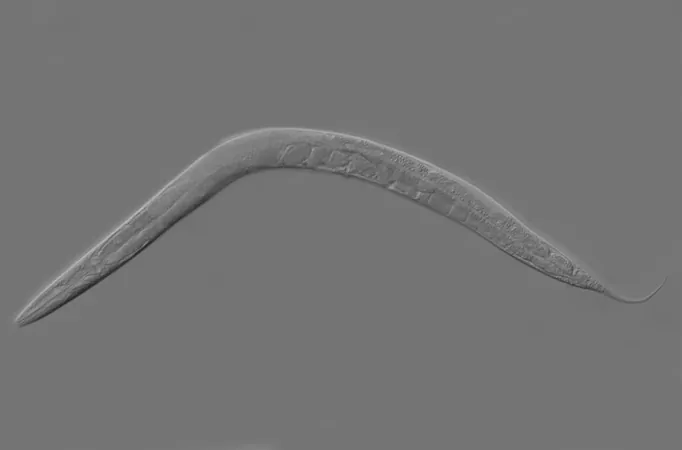
Unlocking the Secrets of Memory: How Worms Balance Sex and Starvation in Their Decisions!
2024-11-14
Author: Yu
A groundbreaking study from UCL researchers reveals an astonishing mechanism in the brains of tiny worms, where conflicting memories of mating and starvation dramatically influence their behavior. This fascinating research, now published in Current Biology, dives into the intricate balance between desires and needs, showcasing how organisms prioritize one memory over another, even when both are active.
Research Focus on C. elegans
The study focuses on male C. elegans, a species of roundworm known for its utility in scientific research due to its simplistic nervous system and transparent body. Researchers conditioned these worms to associate a specific odor with both positive experiences (such as mating) and negative ones (like starvation). This setup aimed to explore the cognitive processes behind decision-making and behavior in animals.
Key Findings
The findings show that when male worms detect the odor linked to both memories, both recollections are activated in their brains. However, only the memory associated with mating overrides the starvation instinct, leading the worms to approach the scent despite their negative associations. "The prospect of mating triumphs over the fear of starvation," explains lead author Dr. Arantza Barrios. The research demonstrates that while the worms’ brains hold onto the negative memory, it does not dictate their actions in the presence of a more potent positive memory.
Experimental Insights
To illustrate this complex interaction, the researchers conducted a series of experiments where worms initially trained to avoid the odor due to starvation conditioning later learned to associate it with mating, effectively retraining their brain's responses. The revelation is that even in a minute organism, such as a roundworm, conflicting memories can coexist, with one actively influencing behavior while the other remains dormant.
Broader Implications
Importantly, these insights extend beyond the microscopic world of worms. The implications of this research shed light on human health conditions where memory and behavior misalignment occurs, such as post-traumatic stress disorder (PTSD). "By understanding how a simple organism deals with conflicting memories, we can gain insights into the more complex human emotional and behavioral patterns," says co-first author Dr. Susana Colinas Fischer. This research could pave the way for novel therapeutic strategies aimed at reconciling conflicting memories in humans.
Conclusion and Future Research
As the study unravels the cellular and molecular mechanisms at play in the brains of these tiny creatures, it sheds light on the adaptability of memory systems and their critical role in survival. This unique blend of motivation and decision-making processes exemplifies how organisms navigate their environments, prioritizing essential needs over competing experiences.
Looking forward, researchers aim to delve deeper into these memory processes, potentially offering new avenues for mental health treatments. What can we learn from the humble worm? The next wave of research holds the promise of illuminating not only the lives of these remarkable creatures but also our understanding of human cognition and behavior. Stay tuned for more exciting revelations from the world of science!


 Brasil (PT)
Brasil (PT)
 Canada (EN)
Canada (EN)
 Chile (ES)
Chile (ES)
 España (ES)
España (ES)
 France (FR)
France (FR)
 Hong Kong (EN)
Hong Kong (EN)
 Italia (IT)
Italia (IT)
 日本 (JA)
日本 (JA)
 Magyarország (HU)
Magyarország (HU)
 Norge (NO)
Norge (NO)
 Polska (PL)
Polska (PL)
 Schweiz (DE)
Schweiz (DE)
 Singapore (EN)
Singapore (EN)
 Sverige (SV)
Sverige (SV)
 Suomi (FI)
Suomi (FI)
 Türkiye (TR)
Türkiye (TR)